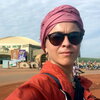Kei Kato (Geography)
Unit for Criticism SCT Fellow, Summer 2024
For the six weeks from June 9 to July 18, I attended Cornell’s School of Criticism and Theory (SCT).
For the six weeks from June 9 to July 18, I attended Cornell’s School of Criticism and Theory (SCT).

Professor Christopher Fennell
Wed, 2:00 - 5:50 PM
100 English Building
608 South Wright Street
Urbana, Illinois 61801